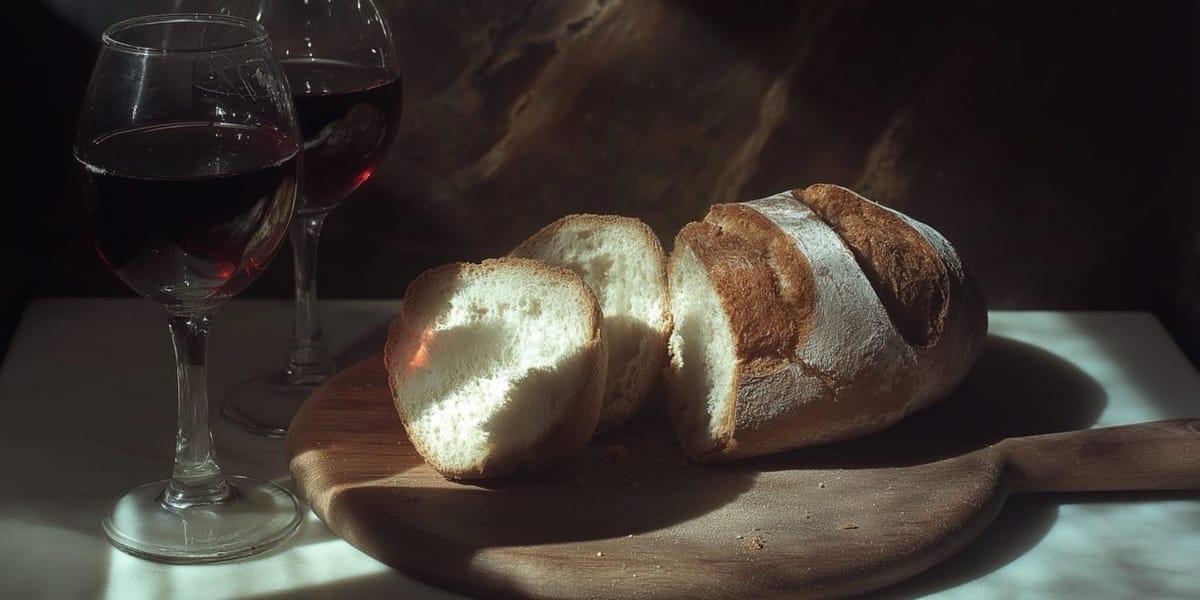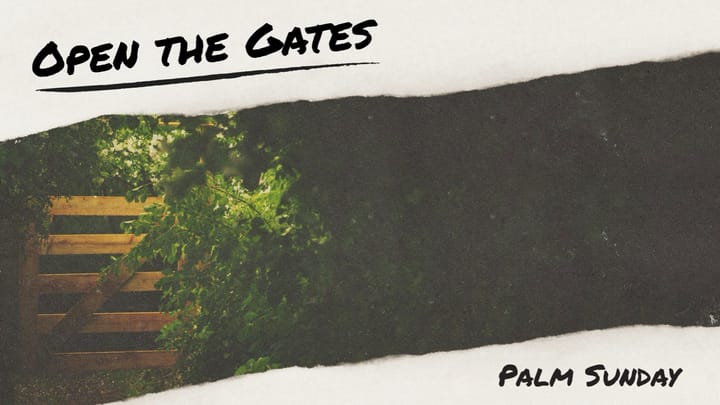Fairhaven Sermon 8-18-2024

In this week's service, Rev. Dylan Parson explored the rich symbolism and meaning behind Jesus' words in John 6:51-58 - "I am the living bread that came down from heaven; if any one eats of this bread, he will live forever." The sermon delved into how Christ's command to eat his flesh and drink his blood is not just a symbol or ritual, but an actual sacrament where Jesus' presence is truly experienced.
Rev. Parson highlighted the discomforting yet beautiful truth that faith often involves mystery and paradox, as exemplified by Jesus' own body being broken on the cross only to be raised in resurrection life. The sermon encouraged listeners to approach communion not just as a symbolic act, but as an encounter with Christ's living presence, where he offers himself freely to feed our deepest needs and give us eternal life.
Transcript
I don't know when they came up with the food pyramid, but I do remember the first time I ever noticed the food pyramid, the first time I ever paid attention to it. So I was sitting at the kitchen table, and I was enjoying a handful of chicken and a biscuit crackers. They might have been twigs, may they rest in peace. You remember twigs? But I flipped the box around and looked at the little diagram that was on the side.
And I'm sure you remember this, the 90s food pyramid. Every Nabisco package had it for a really long time. There was this black 3D pyramid that featured all the different food groups. There were grains at the bottom, then the next level was split between fruits and vegetables, and the next one was split between dairy and proteins, or meat and nuts and everything.
And then at the top, the point of the pyramid, was oils and fats and sugars, which for whatever reason were abstractly represented by a bunch of little dots. So at first I read that as a child, and I thought, Oh, cool. Sugar, grease, fat at the top of the pyramid. Great.
That is of course not what that means, which I believe is part of why this particular model of the food pyramid was phased out over time. A lot of people seem to perceive it that way. But whenever I did realize what it was saying, I remember looking at the bottom of the pyramid where the recommended amount of grains was listed, and it was, I checked this to make sure I remembered it right, up to 11 servings of grains per day. That's what the food pyramid said.
That is a lot of grains. Think about that. That's like half a loaf plus of bread. That's almost two full boxes of pasta.
Don't get me wrong, I love carbs more than any other food group, but 11 servings, 11 slices of bread a day, that's just crazy to me. On the other hand, our world, when you start to think about it, is built on grains. And that's not even an exaggeration. Human civilization is built on grains.
Archeologists and anthropologists will tell you that human civilization, including the first building of cities, like cities were only invented once we began cultivating grain. And that first happened in the fertile crescent of Mesopotamia, today's Iraq, where Abraham was from. And to this day, staple crops account for 90% of the calories that are consumed around the world. 90%.
And basically, every inhabited region on the earth, excepting like Southern Africa, South America before colonization, and the Pacific Islands, where they prefer like starchy root vegetables, you know, South America had the potato, same way. Every region besides those has had their own staple grain for thousands of years. The very thing that their entire diet, their whole civilization was built on. It's still true.
For us in the US and Mexico and Canada too, it's corn. We use it for everything from like flour to sugar to gasoline. It was used by countless Native American peoples the same way. And in Europe and the Middle East, throughout Northern Asia, it's wheat.
They have that all the way through Northern China. In Japan and Southern Asia, it's obviously rice. Jesus was in a wheat culture. And the people of his place and time, like throughout the entirety of the Bible, relied on it heavily.
So back then, actually, the most fertile, productive, valuable territory in the Roman Empire was Egypt because they grew so much wheat along its banks. Egypt provided food for the entire Mediterranean area, and it was all wheat. And wheat was far and away the main fuel for survival. The form that it was eaten, of course, was as bread.
Bread was such a staple in the Middle East that in the Hebrew language, the word for bread, lechem, isn't just bread. It has a much broader range of meaning. The word lechem, bread, can be used for meat, for fruit in some cases, or really just any kind of solid food in general. Bread is everything you can eat.
Bread is a general purpose word that refers to all food. And interestingly, the name of Jesus' birthplace, Bethlehem, actually means house of bread, which takes on a whole new meaning when we look at this morning's Gospel reading from John. Bethlehem was actually the home of the bread of life. So Jesus here, whenever we break into chapter, what are we, chapter six, right? Yes.
Is teaching in the synagogue in Capernaum. And he says in front of the synagogue, I am the living bread that came down from heaven. And he's saying, what he's saying is very obvious, that he's the base of the food pyramid so to speak. He is the most crucial element upon which life is built, more than anything else.
If he's bread, he's everything. He is the staple food for survival. And obviously a claim like that, they would have known that he was saying he was very important, that was confusing for his listeners. But they definitely understand how important he's claiming to be when he describes himself as bread.
He's saying that he's life itself. And he goes on, Whoever eats this bread will live forever. And the bread that I will give for the life of the world is my flesh. Now this is starting to get a little alarming here, to say the least.
This is one of those familiar biblical themes that we have trouble hearing with fresh ears because it's so familiar to those of us who know about Jesus. But imagine hearing that for the first time. And I think even as you heard Kathy say flesh and blood over and over again, you might start to get it. Imagine some new religious teacher gets up in front of you in church and says, You'll live forever if you eat his flesh.
It's really grotesque. It's kind of alarming, right? And so naturally, a commotion bubbles up among his Jewish audience that's sitting around him. How can this man give us his flesh to eat? They're whispering back and forth. This is some crazy stuff that he's talking about.
What is he trying to say? But their question, I think, expresses a mix of discomfort, but also serious interest. They don't just say, Ew, right? They say, How can this man give us his flesh to eat? Because living forever sounds pretty good, but what's all this about eating Jesus' flesh? We don't know about that part. But Jesus, rather than answering their question, continues on teaching and pointedly doesn't ever answer the question. Typical, right? And instead, he pushes it further.
They're already uncomfortable. He makes it worse. To eat the flesh of the human one, the Son of Man, he says, and to drink his blood is not optional, but is the only way to life. Whoever doesn't eat and drink of him has no life in them, he says.
Has no life in them. The same way that someone who doesn't eat bread in that culture has no life in them because they starved. But whoever does eat and drink of his flesh and his blood will be raised up in the last day. They'll be alive now, and they'll be alive forever.
And so now he's still talking in front of the synagogue, right? And no one is less confused than they were four sentences ago. And he makes it worse. He says, Whoever eats my flesh and drinks my blood remains in me and I in them. And he says that's because he's been sent by the Father as the means by which life itself is given to the earth.
And he compares himself to a really familiar story to them, one that we know pretty well too. The manna that the Hebrews received in the Sinai Desert day by day as they were fleeing Egypt for 40 years. They complained they didn't have any food, so God would send them every morning manna, this bread that would gather like dew upon the ground to keep them alive. He's saying he's like that, but different.
Because that bread would rot away each night. They were only allowed to take enough for the day, and then it would rot away into the ground, become impossible to save. And everybody who ate it, meanwhile, would die eventually. Almost all the people who started out on that trip to Sinai were dead before they got to the promised land.
And that is not the case for those who consume Jesus as the bread of life. This is something completely new. This is a bread from heaven that will never decay, but nourish us from death into eternal life. And there, it seems like he ends his teaching in this moment.
He probably steps down from the podium or whatever, and nobody feels like they've gotten anything satisfactory. If his listeners were looking for answers they could comprehend, they don't get them. If they were expecting some kind of day-to-day practical life application they could take away from this sermon, they're going to go away empty-handed. They're not going to get that.
What does it mean, Jesus, to eat your flesh as the bread of life, to gain eternal life through it? Well, it's not clear, if specifics are what you're looking for. He doesn't give those. And this is incredibly frustrating to the Jews of Capernaum, and a lot of grumbling emerges. The rest of the chapter, if you continue on through chapter 6, talks about how his message here is finally a step too far.
They've been tracking with him for a good while. He's talked a little bit about the bread of life, but now that he's said it's his flesh, you know, a lot of them end up leaving him over it. The 12 stay, and some others stay, but John tells us that a lot walk away at this point because this is just too much. And they're facing a challenge that faces us as we read this passage.
Can we live with a mystery? Can we live with hearing something from God that is true, that is beautiful, but just might have us spending our whole lives trying to figure out exactly what it's supposed to mean? I think that we're being invited into that here. You know, don't worry about how what Jesus said works. Don't worry about that. Dig into instead what he's saying, why he's saying it, why it's for you.
You don't need to understand the mechanism, right? His own body he's telling us is bread. That singular food that is so crucial it might as well be synonymous with all food. The staple that makes all the difference between a death of starvation and a prosperous life of feasting between despair and hope. His listeners that day in Capernaum don't know what we do, that he's going to be crucified and killed.
They don't know that yet. But he's telling them what that's going to mean. His bleeding body will be given to them, to us as food. The kind of food from which we'll never go hungry because it's all we need for eternity.
He's given it to us. Now it's easy to get into a kind of routine anywhere in our spiritual lives, but especially at the communion table, I think. You know, we quietly consume our tiny piece of bread, our sip of juice without ever thinking about the magnitude of the mystery that Jesus is describing here. And I'll be honest that this is a big reason that I hate the little prepackaged cups.
I really don't like individualized servings, but I get why we do it. You know, you've got the hygiene thing, right? But how, whenever you have the little prepackaged cup where you take off the plastic, how are we supposed to feel that as the body and blood of Christ? It is, right? But you really have to squint to imagine that the body and blood of Christ is in this little styrofoam wafer, a few milliliters of preserved grape juice. I think it's a little bit easier to immerse ourselves whenever we have a loaf of bread to tear from. Whenever we have a silver cup whose interior seems to like glow blood red.
And maybe whenever we take communion that way, maybe, you know, the Catholics, the Episcopalians, the Lutherans take it by sipping. Maybe it's good in some ways that it's a little bit gross, that it's a little bit more messy. Stick with me here, right? The flesh, the blood of Christ, what Jesus is describing is something alarming, something that should be different. You're able to grasp even a little bit in that the repulsion that the disciples, the people of Capernaum would have felt when he first told them to eat his flesh.
Something is happening whenever we consume his flesh, the bread of life and his poured out blood. This is something powerful, something kind of other worldly, something that is imparting eternal life into us through him. Something that I think often surprises Methodists, even people who have been Methodists their whole life, is that we do not view communion as a symbol or as a memorial of Jesus' sacrifice, but as a sacrament in which Christ is really present, really there. So we don't offer a clean explanation of that.
The Catholic Church teaches that the bread and wine turn into his literal body and blood somehow. We don't have that, you know, but somehow he's there. The great Southern author, novelist Flannery O'Connor famously wrote about communion, you know, If it's just a symbol, to hell with it, she said. If it's not just a symbol, but it's not just a symbol, it's not just a ritual, it's us doing precisely what Jesus is talking about here in John's gospel, eating his flesh and blood to be raised up on the last day to enter into eternal life.
Jesus feeds us, nourishes us, gives us life, and one of the ways he does that is by offering us his body and his blood. And this is puzzling, it's weird, it's uncomfortable, we can't possibly understand it, it might freak us out a little bit when we start thinking about all this bloody imagery, right? The first listeners in Capernaum would have felt the same way. It's good that we're able to access that, but it's the truth. The gospel is puzzling and uncomfortable and weird, more than we like to think about.
And if we lose track of that, we're losing a big part of our faith's power, the mystery of it all. Think about it. Jesus' body, you know, not so long after he preaches to the people at Capernaum, Jesus' body, God's body, is chewed up and swallowed by the world on the cross, like a chunk of digestible bread, dishonored, lowly, earthly, and then he's raised to resurrection life. And we're invited to come participate in that.
God offers his flesh to us the same way every time we come to the table, or even just approach him in prayer. Whenever we go to Jesus asking for something, he hands us the bread of life. He gives himself to us willingly to feed us in our deepest needs. He is broken that we are made whole.
And the key is that Jesus is nothing less than life himself, this staple, this bread. We ourselves, every one of us are bound for death and decay before long. We'll disappear into the ground the same way that manna did every night. But through Jesus, something else entirely is open to us.
Whoever eats his flesh and drinks his blood remains in him and him in us. He has conquered death and through him we do too. Martin Luther, the great reformer who was also a pretty good preacher, once preached to his congregation, I wish I could get you to pray the way my dog goes after meat, he said. Do we go to the communion table or even just go to Jesus at any point in our lives the way a starving person longs for bread, the way a dog tries to get something off the counter that they want really, really badly? Jesus reminds us that we are starving, failing, dying on our own, but he offers us himself, come down from heaven to fill our emptiness, to give us food so that we'll never be hungry again.
You don't have to understand what he does for us, how that all works. It's a mystery. But whoever eats this bread will live forever. In the name of the Father, and the Son, and the Holy Spirit.
Amen.


